American Dairy Association North East has free, on-demand webinars to help you stay up-to-date on the latest dairy research and trends. Find a topic in our webinar library.
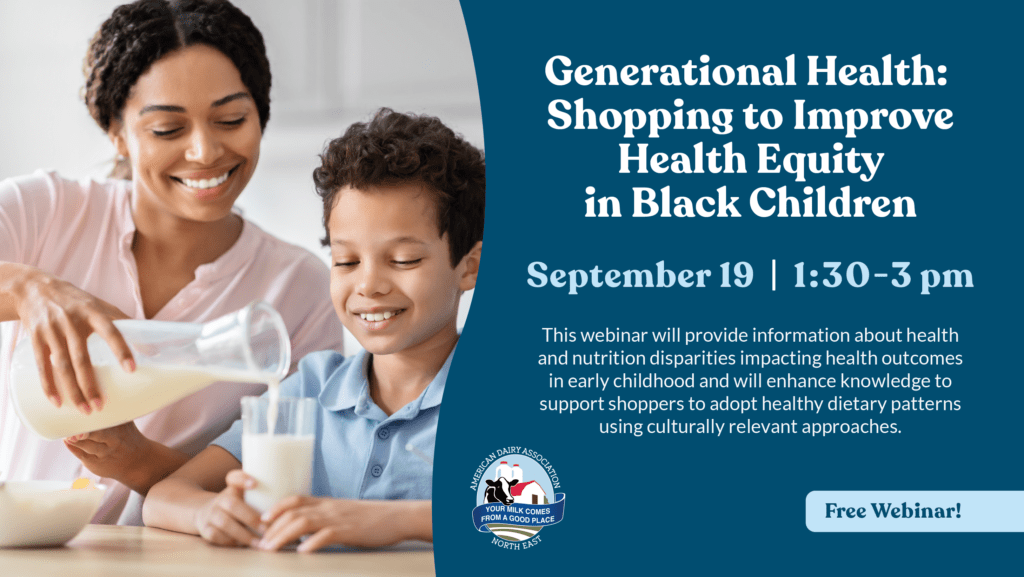
Decades of health data show major disparities occurring at every life stage for Black Americans, beginning with greater maternal and infant mortality rates among Black mothers and their offspring, and culminating in a higher burden of chronic disease and a significantly lower life expectancy.
The first 1,000 days between pregnancy and a child’s second birthday are a brief, but important window of opportunity to nourish early brain development, help children learn to like healthy foods and set the stage for a lifetime of wellness. As they move through toddler and preschool years, it is imperative to solidify these healthy habits.
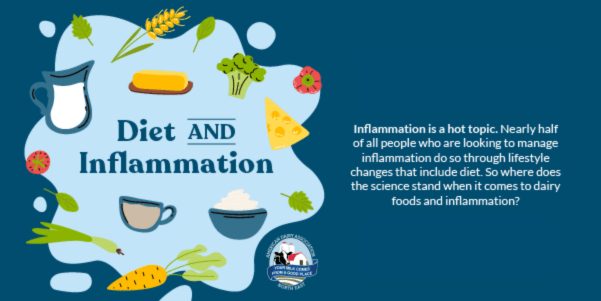
Inflammation is a hot topic with consumers, health professionals and nutrition scientists. Nearly half of all people who are looking to manage inflammation do so through lifestyle changes that include diet. So where does the science stand when it comes to dairy foods and inflammation?
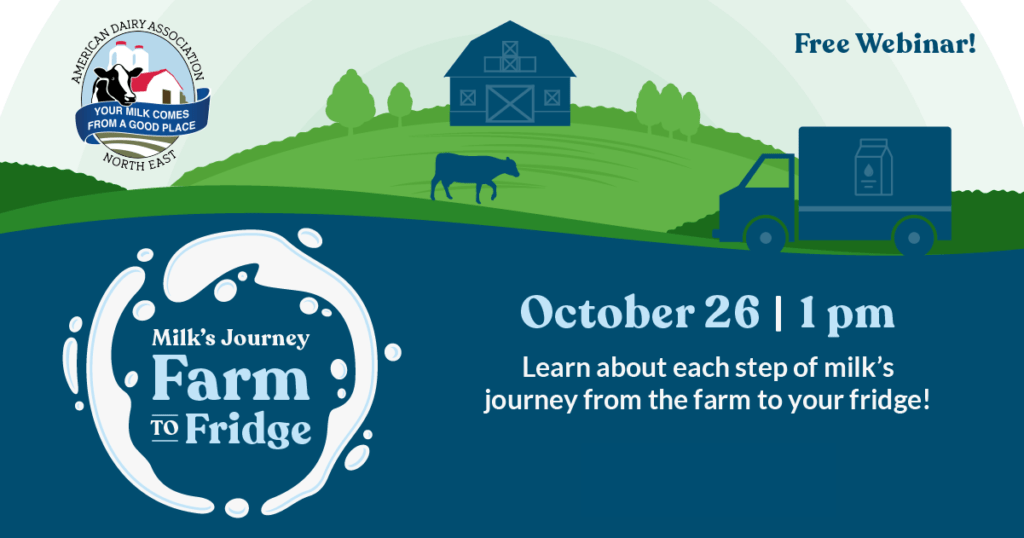
Did you know that milk goes from farm to grocery store in about 48 hours, 365 days a year? Learn about each step of milk’s journey form the farm to your table. This webinar will address how milk is transported from the farm to the processing plant to the grocery store-and what happens each step along the way before it gets to your fridge.

When it comes to their health, Gen Z is all about balance. They see their physical, mental and emotional health as interlinked and equally weighted in importance. During this webinar, health professionals will gain an understanding of the Gen Z consumer segment as it relates to their demographics, behavior, and learning styles around health and wellness. Attendees will learn about the latest science and research as it pertains to health claims supporting immunity, calm, sustained energy, and digestive health – all important topics for Gen Z. Lastly, attendees will be able to translate the science into consumer-friendly health and wellness messages that can be applied when communicating directly with Gen Z.
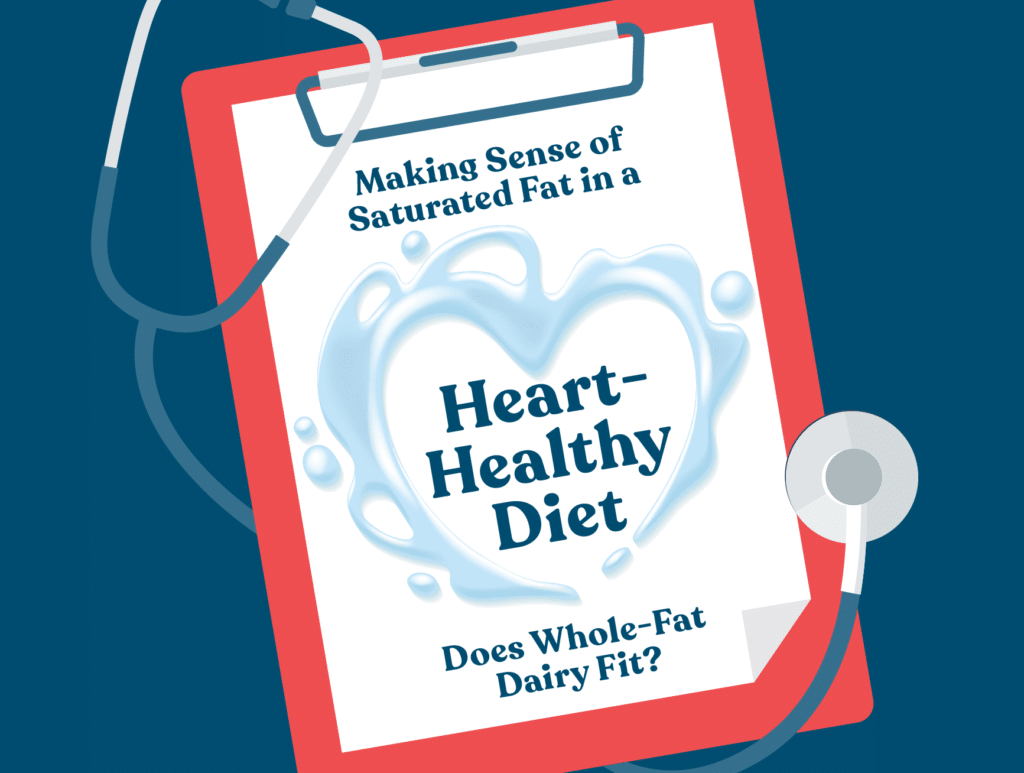
Dietary advice on fat—particularly saturated fat—seems to change daily. This can be disconcerting and confusing for consumers as well as healthcare providers. Current research suggests that total fat is not a risk factor of heart disease. This talk will provide scientific, evidence-based research about this nutrient, and give practical guidance on how to include whole-fat dairy in a heart-healthy diet.
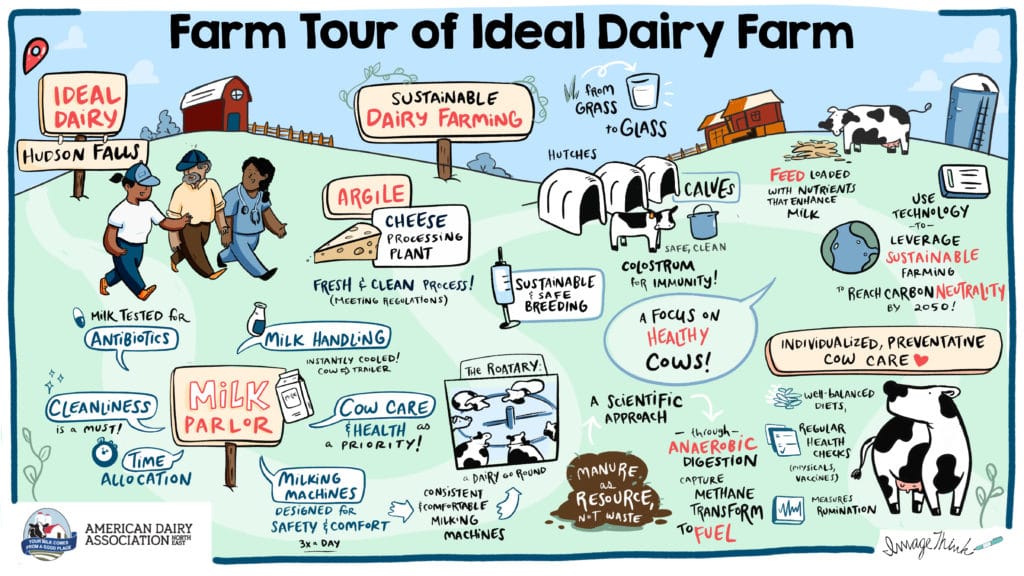
Tour a local dairy farm to learn about modern sustainability practices from the comfort of your own home. Learn where your milk comes from—Farm to Fridge!

Lactose Intolerance is prevalent in diverse populations including African Americans, Latinx and Asian Americans. This webinar will debunk common myths surrounding lactose intolerance and dairy avoidance and discuss dairy’s role in the diet for effective management of lactose intolerance symptoms. Culturally relevant management tips and techniques will also be discussed.

Toby Amidor, MS, RD, CDN, FAND; Adjunct Professor at Columbia University
This is an exciting time for the Dietary Guidelines for Americans (DGA)! Since being created in 1980, for the first time the DGAs are addressing guidelines for 0 to 2 years of age, along with pregnant and lactating women. The presenter will review the history of the DGAs, review the latest modifications, additions, and controversies. Moreover, she will review ways to communicate these guidelines to clients and the general public.
Safe Return to Training and Sports in High School Athletes
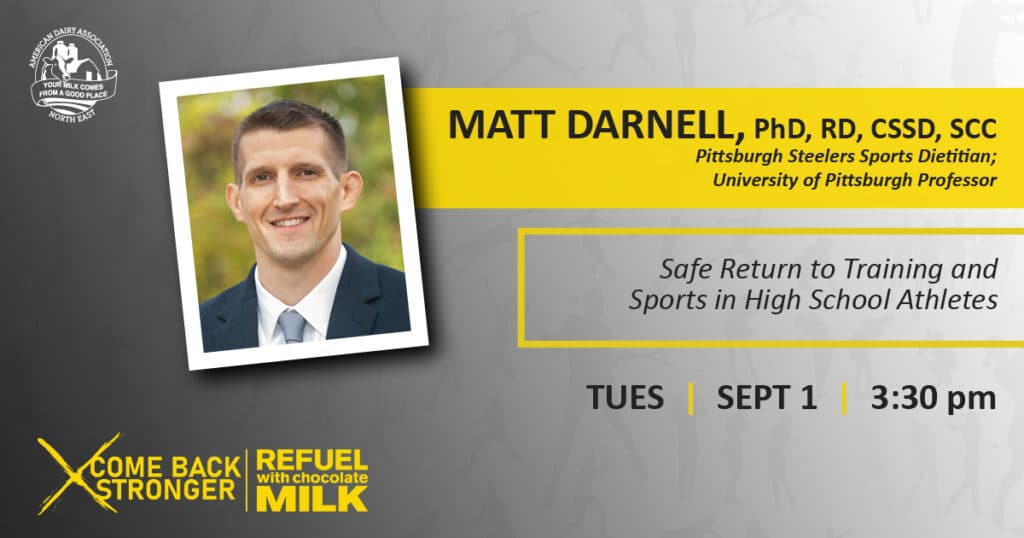
It’s important to understand the risks of training your student athletes especially after following an extended period of inactivity. Join us to learn about how to implement scaled and periodized training approaches as students begin practicing their sport again. Learn key strategies to incorporate preventative training exercises into practices or warm-ups to help student athletes safely return back to sports.
Getting Real About High School Athletes’ Nutrition
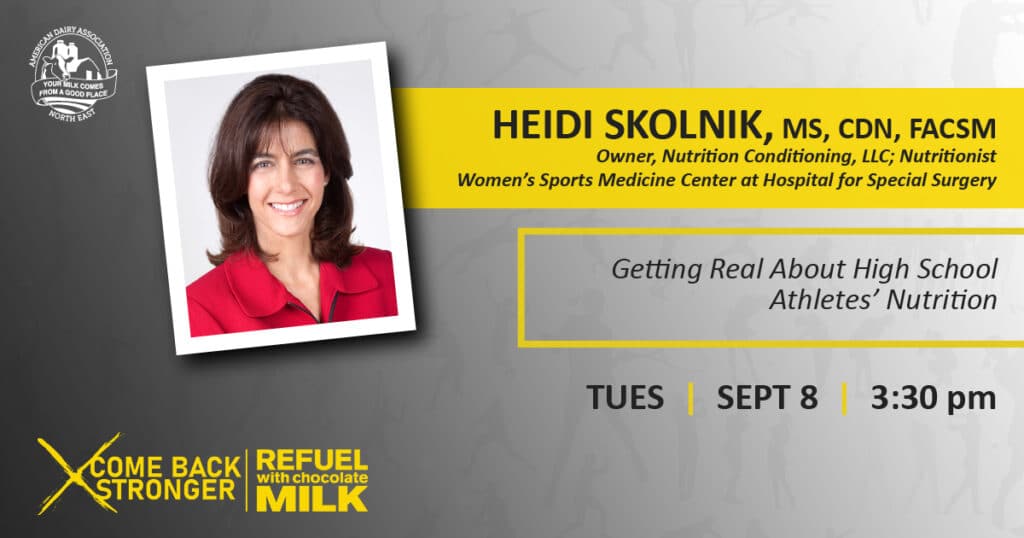
Heidi Skolnik, MS, CDN, FACSM, Owner, Nutrition Conditioning, LLC; Nutritionist, Women’s Sports Medicine Center at Hospital for Special Surgery
High school athletes have a wide range of nutritional needs based on their growth and developmental rates as well as their training duration and intensity. Join us to learn about how to encourage good day-to-day nutrition habits to reach their daily recommended nutrition requirements. Examples of pre and post exercise snacks to fuel high school athletes will be provided.
Hydration Tactics to Fuel High School Athletes
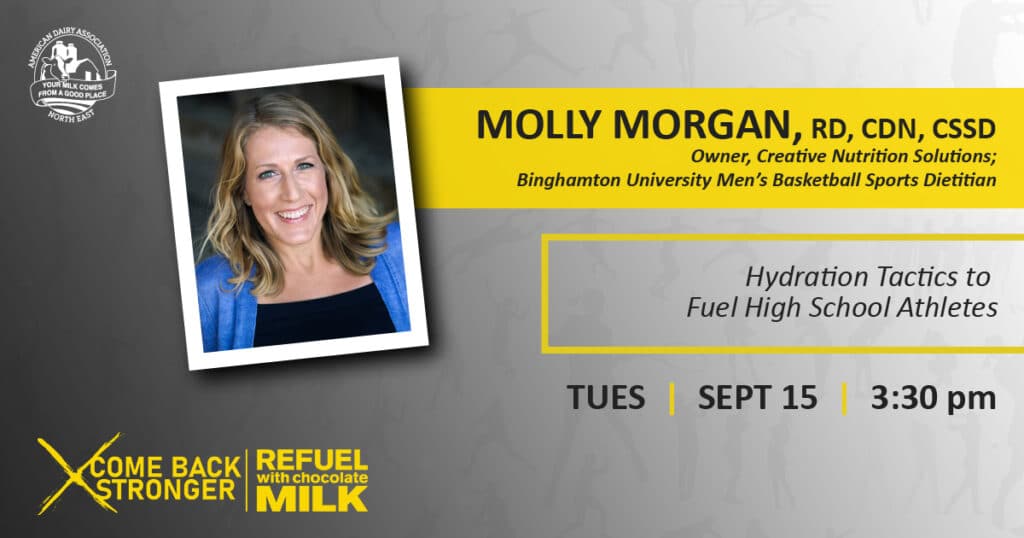
Molly Morgan, RD, CDN, CSSD, Owner, Creative Nutrition Solutions; Binghamton University Men’s Basketball Sports Dietitian
Hydration can greatly impact sports performance in the high school athlete. Join us to learn about understanding the importance of proper hydration as well as familiarizing yourself with the consequences of dehydration. You will also learn about the current hydration recommendations for high school athletes for before, during and after exercise.
Feed the Need: Hunger in the Locker Room
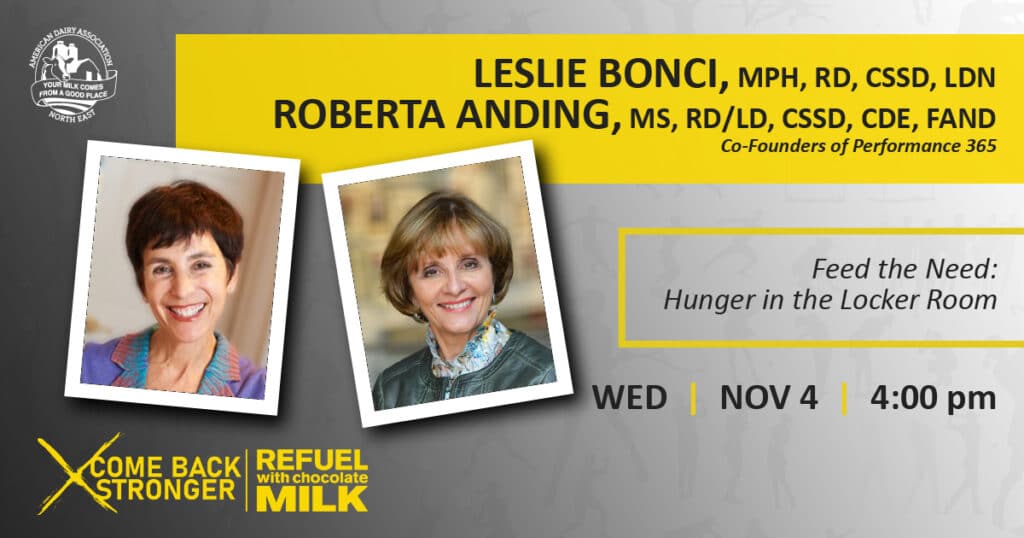
Leslie Bonci, MPH, RD, CSSD, LDN, Co-Founder Performance 365 and
Roberta Anding, MS, RD/LD, CSSD, CDE, FAND, Co-Founder Performance 365
By the end of this session, participants will be able to understand the effects of hunger and inadequate nutrition on health, mental and physical performance; identify student athletes at risk of food insecurity and help them access resources to address hunger; and lastly, implement school, team and community strategies to help improve food availability for high risk student athletes.
Protein: How Much and How Often for the High School Athlete
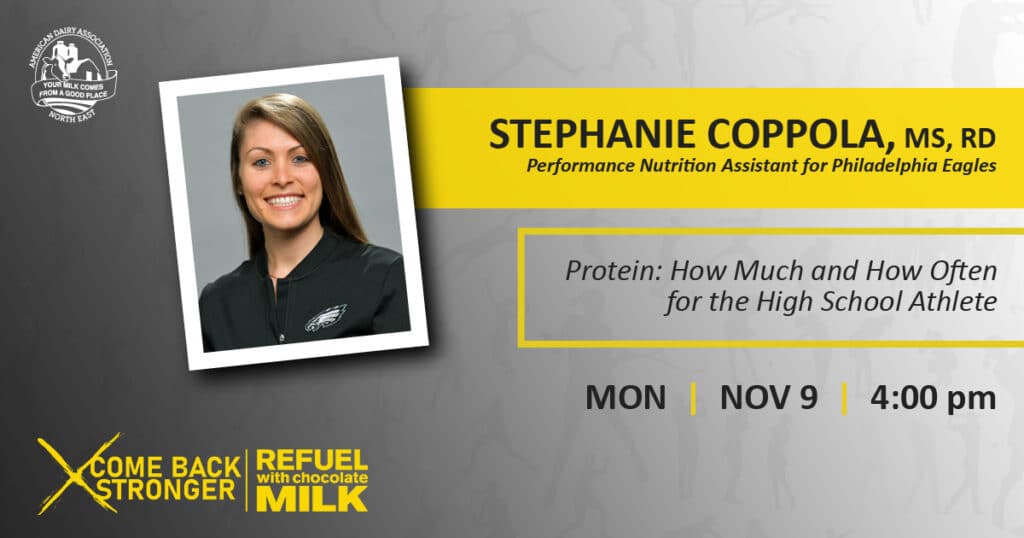
Stephanie Coppola, MS, RD, Performance Nutrition Assistant for Philadelphia Eagles
By the end of this session, participants will be able to understand the important role that protein has in the diet of high school athletes as well as become familiar with the current literature on the protein needs of young, growing athletes. Participants will understand the difference in protein needs when comparing younger athletes to adult athletes and the importance of protein timing. Lastly, participants will learn practical nutrition strategies for high school athletes to incorporate protein into their daily meal plans.
Nutrition Recommendations for Strength Training in the High School Athlete
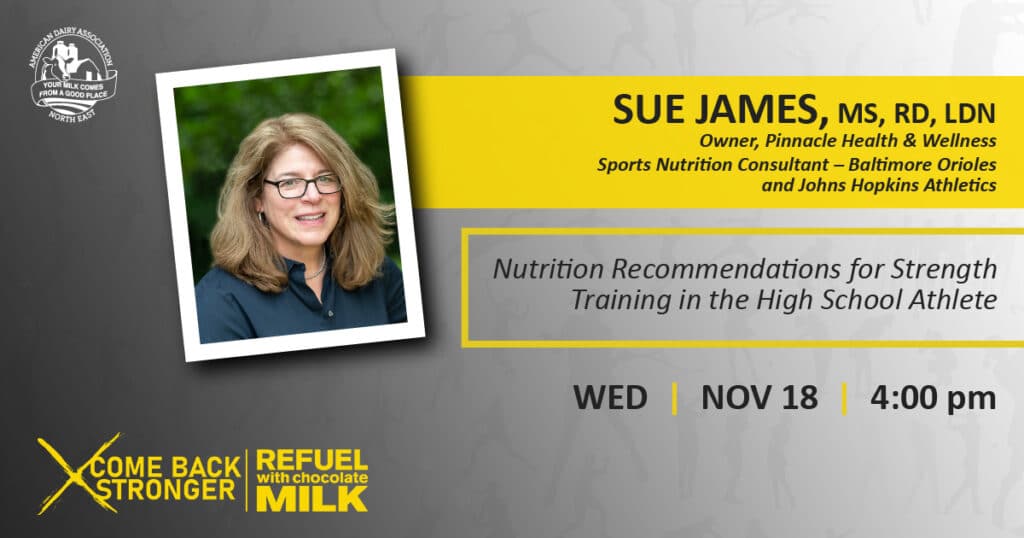
Sue James, MS, RD, LDN, Owner Pinnacle Health & Wellness, Sports Nutrition Consultant to Baltimore Orioles and Johns Hopkins Athletics
By the end of this session, participants will be able to understand the role hormones play in building muscle as well as why those hormones should be present prior to focusing on building muscle (post-puberty) in younger, growing athletes. Participants will also learn how nutrition plays a key role in supporting an athletes training to build strength and muscle. Lastly, participants will be given practical nutrition tips and strategies for high school athletes working to properly build strength and muscular development.






